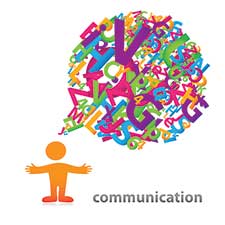Completion requirements
View
Introduction
 The exchange of information between people is communication.
Communication difficulties can be a normal sign of aging or a symptom of another problem.
The exchange of information between people is communication.
Communication difficulties can be a normal sign of aging or a symptom of another problem.
The following sections will give you examples of common communication difficulties, provide you with information to identify the difficulties and give you strategies and resources to help your family member.
What You Should Know
What is communication?
- Communication includes words, gestures, body language, tone of voice and facial expressions.
- Thinking and understanding are needed for coming up with a message and for understanding other people.
- The ability to express your message and understand another person’s message is important for good communication.
 What is a Communication Difficulty?
What is a Communication Difficulty?
- A communication difficulty is a problem with sending or receiving a message.
- Hearing loss, word-finding trouble or decreased memory are some examples of normal communication difficulties that can happen with aging.
Some Signs of Communication Difficulties
- Slurred or quick speech
- Word errors or long pauses
- Withdrawal from social situations
- Inappropriate answers to questions
- Trouble staying on topic during conversation
- Changes in voice quality
- Fast, slow or repetitive speech
- Difficulties reading or writing
- Not understanding other people
Possible reasons for Communication Difficulties
- Normal aging
- Medical Problems: Neurological disease (e.g. Parkinson’s Disease, ALS), Dementia, Psychiatric Disorders, Tumors, Head injury, Stroke
- Medication side effects
- Hearing or Vision problems
What can I do to help?

- A Speech-language Pathologist can test communication and give specific recommendations for people who have a medical problem that is causing communication difficulties.
- General recommendations that can help older adults with communication include:
- Ask one question at a time or give more choices (e.g. do you want apple juice or orange juice?), if someone is struggling with an open-ended question (e.g. What do you want to drink?).
- Reduce background distractions (e.g. turn the television off or move to a quiet area).
- Provide reminders for people to wear hearing aids or dentures.
- Encourage all communication (e.g. speaking, gestures, writing, facial expression, tone of voice).
- Choose familiar topics (e.g. family members or favourite activities) for conversation and let the person know when you are suddenly changing topics.
- Be patient and allow extra time for responses.
- Give your full attention when communicating (e.g. speak while facing the person, use eye contact, focus on what the older adult is trying to say).
- Allow older adults time to talk about their memories (i.e. reminisce).
When to Seek Medical Advice
- Call your doctor or Health Link if you notice any of the difficulties listed above and those difficulties are causing frustration or are impacting their ability to get needs met. The doctor can refer to a Speech-Language Pathologist, who can give recommendations to help with communication.
- Go to emergency if you notice a sudden onset of speech or communication difficulties, especially if this includes slurred speech, an inability to talk or speech that does not make sense.
Last modified: Wednesday, 27 April 2022, 8:48 AM